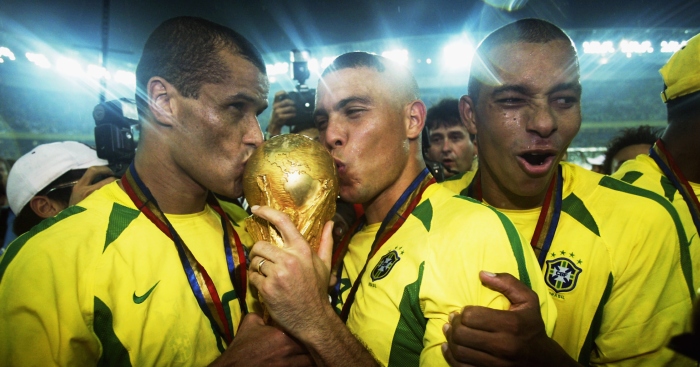The 2002 FIFA World Cup Final: Brazil's Redemption and Ronaldo's Heroics
Analyzing and recapping classic matches, especially the 2002 FIFA World Cup Final, is a fascinating journey into the annals of football history. This particular final, held in Yokohama, Japan, on June 30, 2002, saw Brazil facing off against Germany in a match that encapsulated the culmination of a month-long tournament filled with drama, passion, and exceptional skill.
Introduction to the 2002 World Cup
The 2002 FIFA World Cup was a pivotal event for several reasons. It marked the first time the tournament was held in Asia, jointly hosted by South Korea and Japan. The choice of venues and the global nature of the competition underlined FIFA's commitment to spreading the joy of football across continents. The tournament featured 32 teams, with the matches showcasing the diverse talent and tactics from across the globe.
Brazil's Journey to the Final
Brazil, a perennial football powerhouse, had a storied history in World Cup competitions. Led by coach Luiz Felipe Scolari and star players such as Ronaldo, Rivaldo, and Ronaldinho, Brazil entered the 2002 tournament with high expectations but had to navigate through a challenging path to reach the final.
Their journey started with a group stage that included Turkey, China, and Costa Rica. Brazil demonstrated their flair and attacking prowess, topping their group with three wins. In the knockout stages, they faced stiff competition from teams like Belgium and England, overcoming them with a blend of individual brilliance and collective team strategy.
Germany's Path to the Final
Germany, another footballing giant, had a rich World Cup history of their own. Coached by Rudi Völler and featuring stalwarts such as Oliver Kahn, Michael Ballack, and Miroslav Klose, Germany showcased resilience and tactical acumen throughout the tournament.
Germany's path to the final saw them emerge from a group that included the Republic of Ireland, Cameroon, and Saudi Arabia. They progressed through the knockout stages with victories over Paraguay and the United States, showcasing their trademark efficiency and ability to capitalize on opponents' mistakes.
The Final Showdown: Brazil vs. Germany
The 2002 World Cup final was set to be an epic encounter between two footballing giants. Brazil, with their attacking flair and creativity, faced Germany, known for their disciplined defense and strategic approach. The clash in Yokohama promised not only to decide the world champions but also to showcase the contrasting styles of two footballing philosophies.
First Half: Brazil's Dominance
From the outset, Brazil asserted their dominance on the game. The midfield trio of Gilberto Silva, Kleberson, and Rivaldo controlled the tempo, while Ronaldo's movement and clinical finishing posed constant threats to the German defense. It was Ronaldo who opened the scoring in the 16th minute, capitalizing on a defensive lapse to slot the ball past Oliver Kahn.
Brazil continued to press forward, exploiting spaces and testing Kahn with long-range efforts from Rivaldo and Roberto Carlos. Germany struggled to gain a foothold in midfield, with Michael Ballack's influence limited by Brazil's pressing and compact defensive shape.
Second Half: Germany's Fightback
The second half saw Germany come out with renewed vigor. Rudi Völler's halftime adjustments seemed to invigorate the German side, who started to create chances of their own. Miroslav Klose, Germany's talismanic striker, began to trouble Brazil's defense with his movement and aerial prowess.
In the 67th minute, Germany found their equalizer through a powerful header from Klose, capitalizing on a well-delivered cross from Bernd Schneider. The goal injected new life into the match, setting up a tense and dramatic final quarter.
Extra Time: Ronaldo's Redemption
With the score tied at 1-1 after 90 minutes, the final went into extra time. Both teams showed signs of fatigue, but it was Brazil who seized the initiative once again. Ronaldo, who had endured criticism and doubts earlier in the tournament, rose to the occasion.
In the 79th minute of extra time, Ronaldo restored Brazil's lead with a clinical finish past Kahn. The goal came from a swift counter-attack, highlighting Brazil's ability to transition from defense to attack with speed and precision.
As the final whistle blew, Brazil emerged as deserving champions, winning their fifth World Cup title. Ronaldo, who scored both goals in the final, was named the tournament's top scorer and Player of the Tournament, cementing his place as one of Brazil's greatest footballing legends.
Significance of the 2002 World Cup Final
The 2002 World Cup final between Brazil and Germany holds immense significance in the history of football for several reasons:
Brazil's Redemption: After a disappointing quarter-final exit in the 1998 World Cup on home soil, Brazil's victory in 2002 was seen as redemption. The team showcased a blend of attacking flair and defensive resilience under coach Luiz Felipe Scolari, reclaiming their status as the world's best.
Ronaldo's Comeback: Ronaldo's journey to redemption mirrored Brazil's. Overcoming injuries and doubts about his form, Ronaldo's performance in the final cemented his legacy as one of the greatest strikers in football history. His brace in the final was a testament to his skill, determination, and ability to perform on the biggest stage.

Tactical Battles: The final also highlighted the tactical battles between two experienced coaches, Luiz Felipe Scolari and Rudi Völler. Brazil's ability to control the midfield and exploit spaces, contrasted with Germany's disciplined defensive approach and counter-attacking threats, made for a compelling tactical duel.
Global Impact: The 2002 World Cup, with its innovative venues and global reach, expanded football's popularity in Asia and showcased the sport's ability to unite nations and cultures. The final itself was watched by millions worldwide, underscoring football's status as a truly global phenomenon.
Conclusion
In conclusion, the 2002 FIFA World Cup final between Brazil and Germany was a memorable chapter in football history. Brazil's victory, fueled by Ronaldo's heroics and the team's collective brilliance, remains etched in the minds of football fans around the world. The final not only decided the world champions but also symbolized the spirit of competition, resilience, and skill that define the beautiful game of football.
As we reflect on historic matches like the 2002 World Cup final, we celebrate the moments of brilliance, the narratives of redemption, and the enduring legacy of football as a sport that captivates and inspires millions globally.






